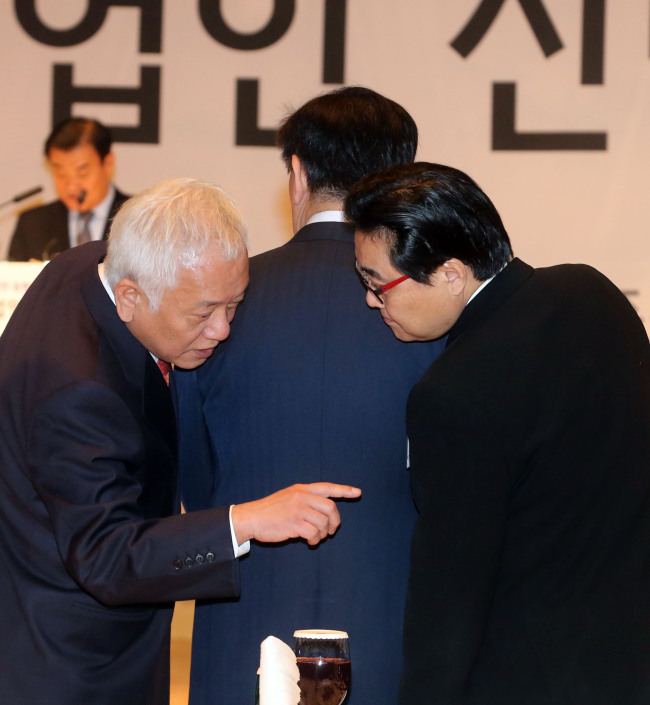
Democratic Party Chairman Rep. Kim Han-gil (left) talks with DP floor leader Rep. Jun Byung-hun (right) on Monday, with the ruling Saenuri Party floor leader Rep. Choi Kyunghwan standing between the two. (Yonhap News)
Political bickering over the ruling Saenuri Party’s proposals for reforms in provincial governance escalated on Monday as the main opposition Democratic Party stepped up its criticism that the suggestions would undermine grassroots democracy.
On Sunday, the Saenuri Party put forward a set of reform plans, which it argues are aimed at increasing efficiency and transparency in provincial governance mechanisms.
Among them was to dissolve legislative bodies of low-level administrative units such as districts and counties. Saenuri officials called the bodies “redundant” as their operations overlapped with those of adjacent municipal legislatures.
The DP denounced the ruling party for “depriving citizens of grassroots democracy.” The Saenuri Party called on the DP to discuss the issue rather than upping its political offensive ahead of the major local elections slated for June.
“DP officials have come out disavowing our proposals without taking steps for some kind of conversation,” said Saenuri secretary general Rep. Hong Moon-jong on Monday. “I urge the DP to join in the discussion,” he added.
The ruling party’s plans for provincial reforms also include retaining the current candidate nomination system for local elections. Critics have said the system, often directed by party leaders, should be reformed into a more transparent and democratic blueprint given deep-rooted suspicions of corruption in the selection process.
Rep. Lee No-keun of the ruling party pointed out that removing the system would cause a series of problems however, such as preventing fair assignments of candidate slots for minorities.
“If we really part ways with this system, there is an array of problems that can come up,” Lee cautioned on a radio show. “Protecting the rights of minorities, such as women and the disabled, can become a problem. Not to mention that we have to consider the possibility of an unlimited list of people applying for election candidacies, making it difficult to carry out a more straightforward and transparent voting system,” he added.
Setting up elections around candidates nominated by major political parties has been the norm in Korea. All three of the major presidential candidates in 2012 however ― President Park Geun-hye, DP Rep. Moon Jae-in, and independent Rep. Ahn Cheol-soo ― had vowed to get rid of the system.
“This is an outright dismissal of one of the most important pre-election campaign promises made by President Park,” said DP Rep. Yoon Hu-duk. “Allowing political disputes at the center to flow into local politics is something we have to prevent,” the lawmaker added.
The proposed plans are expected to cause a stir among voters in the June elections according to analysts. Prominent provincial offices will be contested, including Seoul’s mayorship and Gyeonggi Province’s governorship. Political analysts also view the elections as a barometer measuring the popularity of the ruling party and President Park among voters, adding weight to the elections’ importance.
By Jeong Hunny (hj257@heraldcorp.com)



![[KH Explains] No more 'Michael' at Kakao Games](http://res.heraldm.com/phpwas/restmb_idxmake.php?idx=645&simg=/content/image/2024/04/28/20240428050183_0.jpg&u=20240428180321)


